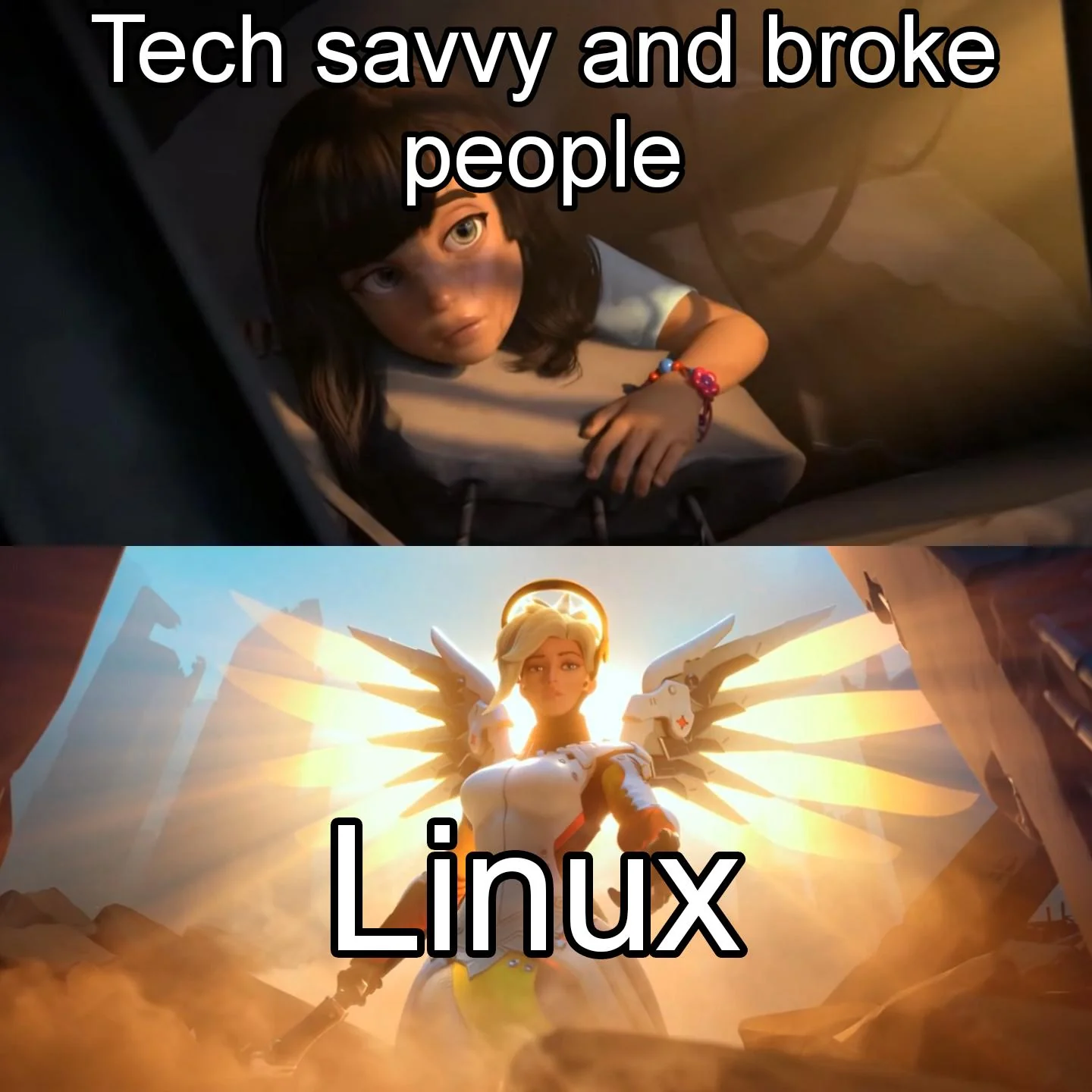this post was submitted on 07 May 2024
972 points (98.1% liked)
linuxmemes
24540 readers
2941 users here now
Hint: :q!
Sister communities:
Community rules (click to expand)
1. Follow the site-wide rules
- Instance-wide TOS: https://legal.lemmy.world/tos/
- Lemmy code of conduct: https://join-lemmy.org/docs/code_of_conduct.html
2. Be civil
- Understand the difference between a joke and an insult.
- Do not harrass or attack users for any reason. This includes using blanket terms, like "every user of thing".
- Don't get baited into back-and-forth insults. We are not animals.
- Leave remarks of "peasantry" to the PCMR community. If you dislike an OS/service/application, attack the thing you dislike, not the individuals who use it. Some people may not have a choice.
- Bigotry will not be tolerated.
3. Post Linux-related content
- Including Unix and BSD.
- Non-Linux content is acceptable as long as it makes a reference to Linux. For example, the poorly made mockery of
sudoin Windows. - No porn, no politics, no trolling or ragebaiting.
4. No recent reposts
- Everybody uses Arch btw, can't quit Vim, <loves/tolerates/hates> systemd, and wants to interject for a moment. You can stop now.
5. 🇬🇧 Language/язык/Sprache
- This is primarily an English-speaking community. 🇬🇧🇦🇺🇺🇸
- Comments written in other languages are allowed.
- The substance of a post should be comprehensible for people who only speak English.
- Titles and post bodies written in other languages will be allowed, but only as long as the above rule is observed.
6. (NEW!) Regarding public figures
We all have our opinions, and certain public figures can be divisive. Keep in mind that this is a community for memes and light-hearted fun, not for airing grievances or leveling accusations. - Keep discussions polite and free of disparagement.
- We are never in possession of all of the facts. Defamatory comments will not be tolerated.
- Discussions that get too heated will be locked and offending comments removed.
Please report posts and comments that break these rules!
Important: never execute code or follow advice that you don't understand or can't verify, especially here. The word of the day is credibility. This is a meme community -- even the most helpful comments might just be shitposts that can damage your system. Be aware, be smart, don't remove France.
founded 2 years ago
MODERATORS
you are viewing a single comment's thread
view the rest of the comments
view the rest of the comments

I see what you're saying, but I also think it's actually a mark in Linux' favor that is continues to run so well on older or underpowered hardware. It's how I really got into it, being broke and able to eke out years more life on older computers when I could ill afford upgrades. These days, I'm happy that I can get off the upgrade treadmill for longer. The most demanding games I've installed are the Final Fantasy I-VI Pixel Remasters and Grandia. I'm not a programmer, don't have to render graphical stuff for work, etc, so it's pretty great that I don't have to worry about my budget desktop being unusable in 4 years because the OS devs have made it a practical impossibility to run on older hardware. I've got 32GB of RAM, and my biggest threat to usability is leaving Firefox running with a ton of open tabs for weeks on end, which can conveniently be solved by closing Firefox and watching my RAM use plummet.
Not everyone is going to be a gamer, graphics designer or programmer that really needs the latest and greatest in hardware. In fact, I'd wager the majority of people won't notice an improvement outside of a few cases. Upgrading from an HDD to an SSD, <16GB of RAM to >16GB of RAM and from an older graphics card to a newer one that supports 4K are pretty easy differences to note in normal use. Those aside, I think most people would be hard-pressed to identify an objective difference in the quality of their browsing and word processing experiences. Depending on how flexible people are with adapting to different workflows, even those could be minimized, to an extent. I have a desktop I bought second hand twenty years ago that served as my main computer into and beyond my initial forays in university. It has a whopping two cores, and I think I might have managed to get 16GB of RAM into it. It'd probably suck for web browsing and wouldn't be terribly efficient for power use, but I bet you if I reinstalled things, it would work just fine for serving up my music library via mpd, playing it with ncmpcpp and writing term papers in Auctex, same as it did back then. Even if I put an older version of Windows on it like Windows 7, I bet it would struggle to run those same programs on top of the base OS. That's legitimately impressive, when you think about it.
Thank you for the nice write-up. I agree that it is great and whatis very impressive. Also to see old hardware not going to a landfill. I have definitely "fixed" up friend and elderlies computers by installing Ubuntu, and more lately I tried fedora silver blue for a friend. And I too have second hand ThinkPads, a P53 6 core, 64gb, rtx3000 and a t440 and then my work machine is a xps13 (not secondhand). It runs great on all of these and linux is a real workhorse.
I think my point of view come from windows "techies" that seem to be completely oblivious to Linux outside of running it on a Raspberry pi or the like, and linux is only as a way to "save" a computer because windows can't run on it anymore. To me, Linux is a first choice for server, workstations, home use, gaming.. really anything, but I might be biased.. like most of us in this forum 😅😉